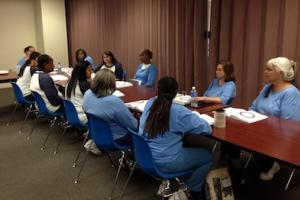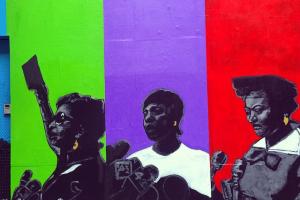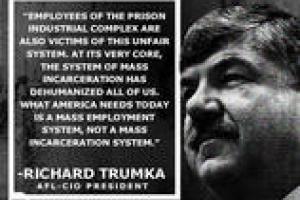Protesters March to Call for Close of Rikers Island
Times Ledger
Our history of racial terror casts a shadow across the U.S. landscape. We must engage it more honestly.
 The US imprisons more women, both per capita and in absolute numbers, than any other country. As shocking as the statistics are, they don’t reflect the uniquely horrible circumstances many incarcerated women faced before their convictions. And, according to a report released Wednesday, women are also the fastest growing demographic in our jails, where people are booked and held pending trial, greatly exacerbating the societal disadvantages these women already face.
The US imprisons more women, both per capita and in absolute numbers, than any other country. As shocking as the statistics are, they don’t reflect the uniquely horrible circumstances many incarcerated women faced before their convictions. And, according to a report released Wednesday, women are also the fastest growing demographic in our jails, where people are booked and held pending trial, greatly exacerbating the societal disadvantages these women already face.
A new museum in Alabama is designed to reveal the racial challenges of our nation's history and the opportunities for a future where we engage in truth and reconciliation.
Bryan Stevenson, founder of the Equal Justice Institute, talks about how slavery didn't just end in 1865, but how it evolved through Jim Crow, segregation and mass incarceration.
 Decades later, the extreme, extrajudicial brutality Emmett Till encountered is almost inconceivable. Nevertheless, violence against African-American bodies still takes place today, sustained by a criminal justice system that provides everything but justice. And mothers like Mamie Till are still at the forefront of the fight for justice for their children and all children.
Decades later, the extreme, extrajudicial brutality Emmett Till encountered is almost inconceivable. Nevertheless, violence against African-American bodies still takes place today, sustained by a criminal justice system that provides everything but justice. And mothers like Mamie Till are still at the forefront of the fight for justice for their children and all children.
 In the past, unions sometimes shied away from knocking down systematic injustices, especially with regard to race. Not anymore. This is not the labor movement from last century. We will not sit on the sidelines. #FREEAMERICA is committed to joining others who are on the ground, doing the work to fix our broken criminal justice system. We are committed to standing with workers who are already in our schools standing between young people and the criminal justice system.
In the past, unions sometimes shied away from knocking down systematic injustices, especially with regard to race. Not anymore. This is not the labor movement from last century. We will not sit on the sidelines. #FREEAMERICA is committed to joining others who are on the ground, doing the work to fix our broken criminal justice system. We are committed to standing with workers who are already in our schools standing between young people and the criminal justice system.
 Their is a connection between mass incarceration and mass deportations. The broken prison system is linked to the conditions in detention centers and the overall mass criminalization of communities of color. The labor movement is a movement of second chances and firmly believes the criminal justice system in the United States needs to offer people another chance to contribute to and be full members of our society.
Their is a connection between mass incarceration and mass deportations. The broken prison system is linked to the conditions in detention centers and the overall mass criminalization of communities of color. The labor movement is a movement of second chances and firmly believes the criminal justice system in the United States needs to offer people another chance to contribute to and be full members of our society.
Spread the word